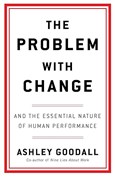As companies have adapted to rapid advances in technology and digitization in recent years, the belief has grown that ‘change’ is invariably good and essential for growth. The unsettling downside to change and the benefits of continuity have rarely been mentioned.
It is regularly reported that around 70% of M&A deals fail (i.e., one plus one does not even equal two, whereas three was intended). According to Forbes the same 70% failure rate applies to other corporate change initiatives too. Why if this is the case do so many organizations revere change as the holy grail of business success?
Belief in change and transformation as panaceas for growth, comes from the universal human urge for greener pastures. In recent decades, in the business world, this urge has been fed by the concept of “creative destruction”—the idea, originated by Joseph Schumpeter and championed by Clayton Christensen, that established companies must embrace disruption and reinvention to fend off upstart newcomers and maintain competitive advantage. Today, post-pandemic, faced with economic and geopolitical uncertainty, ‘change’ has been replaced by ‘resilience’ as the watchword of our times.

Ashley Goodall’s new book The Problem with Change: And the Essential Nature of Human Performance fits with the times, refreshingly countering the received wisdom that change is always good. Drawing on extensive research into human psychology and decades of experience leading HR teams at organizations like Cisco and Deloitte, Goodall reveals how change and reorganization, unless thoughtfully and sensitively managed, are more likely to bring turmoil, uncertainty, a lack of control, a sense of unbelonging, and a loss of meaning, than any measurable improvement.
Ongoing change initiatives invariably make it more difficult for employees to get work done and consequently undermine performance in the short run—and often in the long run too, as the 70% failure rate reported by Forbes suggests. In the first part of his book Goodall explains why this is and through real-life examples shows how it is manifested. He then goes on to offer an alternative, arguing that “The ultimate job of leadership is not disruption, and it is not to create change; it is to create a platform for human contribution, to create the conditions in which people can do the best work of their lives.”
Goodall, having opened the book with a horrendous tale about a company plagued with an endless procession of upheavals driven by management consultants and wellness gurus, goes on to show how necessary change should be done. In the complex fast-changing world businesses operate in, changing strategic direction and restructuring organizations may of course be essential. To manage this well, Goodall contends that leaders must first create, a sense of continuity and stability, and build the engagement and commitment of people before the energy and creativity required for effective change can be harnessed.
At the core of the book Goodall explains why respect for the “fundamental ingredients of human good-functioning” is key to managing change. He shows how factors such as certainty, predictability, having agency, and belongingness, stability and rootedness are essential to inspiring committed human endeavour—and yet are too often overlooked in the workplace and readily dismissed when change projects are afoot.
The book offers leaders a series of invaluable insights on how to develop a people-centred, stability-led, approach to change. The advice includes a chapter—Radicalize HR—that argues for HR people to take a lead in this; for HR to “engage directly with the needs of people on the front lines, and to help meet those needs;” to drive a company’s performance by truly representing the interests of the people working in it. Refreshingly, and typical of the author, this goes against another piece of received wisdom—that the priority of HR professionals should be to “have a seat at the table.”
…………………………………………………………………………………………………………………..
‘The Problem with Change: And the Essential Nature of Human Performance,’ Ashley Goodall. Published by Little Brown Spark, 2024. ISBN 978‑0‑316-56027‑6

































